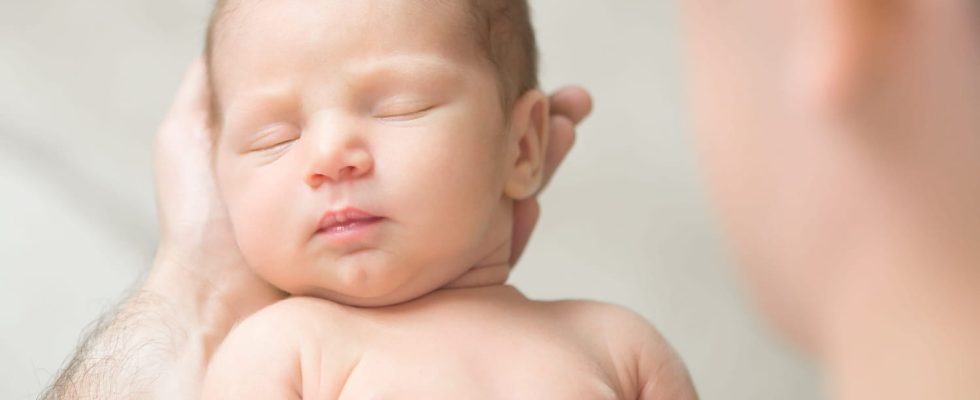Did you know that at birth, a baby can only breathe through the nose? Eh yes ! Babies are full of surprises. Overview of their surprising secrets with childcare nurse Sharlenn Saint Fort.
No matter how much we think we know everything about babies, our little darlings are born with their share of surprises, sometimes charming, sometimes surprising! Hair, vision, strength, tears, breathing… Discover below a crisp anthology of what we often ignore about newborns, supported by Sharlenn Saint Fort, nursery nurse.
1. Babies can’t breathe through their mouths.
“Until about 5 or 6 months, infants only breathe through their noses.“, reveals Sharlenn Saint Fort. The indicator to know that baby is able to breathe through the mouth: when he can blow, so when he starts to babble.
2. Almost all babies are born with blue eyes.
Most babies are born with blue-gray eyes, but be careful, warns the nurse, “the color of their eyes is not yet final”. This changes frequently until the child is 6 months old. Rarely beyond.
3. Newborns have no tears or smell
“At the tear level, the system is not yet optimal in the first weeks of life, so it does not allow the secretions of tears in newborns”, reveals the childcare worker. That’s why, before 3 months, when he cries, our baby has no tears flowing from his eyes.
But that’s not all ! Before 6 months, the baby also does not secrete sweat or body secretions. However, body odors come from these bodily secretions. So, apart from our own smell or that of his shampoo, baby does not yet have its own smell.
4. Some babies are born with teeth.
It happens, from time to time, that a baby comes into the world with one or more baby teeth already out. The reason is simple: when they are born, they already have their teeth in the gums, this is called buds. “These buds will come out, in principle, when the babies have their dental breakthroughs. However, some babies come out with their buds before and therefore are born with teeth.” decrypts Sharlenn Saint Fort.
5. Newborns have more bones than us at birth.
At birth, babies have more bones than adults, sincethey have nearly 350 bones when adults count about 206. Actually, his bones just aren’t all welded together yetas in adults. “It is also for this reason that in the event of a fracture, the latter consolidates more quickly in the toddler”underlines, the nursery nurse Sharlenn Saint Fort.
6. Some babies lose their hair after birth
When it comes to hair, at birth, there are no rules. Some are born with a sparse scalp, others with a beautiful fleece.. The latter can fall totally or partially and push back in the year. “The following hair will often be very different from their initial nature”, observes the nurse. The reason ? When he was in his mother’s womb, his hair was always in contact with water, since it was bathed in amniotic fluid. Once the hair is exposed, when the baby is out, it can take on its natural shape which will then differ from its birth fleece.
7. Baby cannot see colors well, but sees contrasts
At birth, newborns have difficulty distinguishing colors. “They will need wait until you are between 5 and 6 years old to perceive colors as well as an adult“, notes the childcare worker. On the other hand, the baby sees contrasts very well. And especially black and white which is the strongest contrast.
It also easily distinguishes contrasts in our face, which is also why, naturally, when we communicate with a baby, we greatly exaggerate the expressions on our faces. Indeed, our teeth are whiter and our eyebrows darker than the color of our skin and it is precisely the elements of our face that we will greatly animate by addressing him.
8. Babies are stronger than you think.
As Sharlenn Saint Fort reminds us: newborns still only have reflexes. For example, “At the maternity check-up, we will position the baby on his stomach, observe him and realize that he is able to push on his legs to be able to move forward a few centimeters”. While this may seem trivial, this push by reflex requires a lot of strength.
But, “What will have required the most strength from him is to manage to extricate himself from his mother’s womb”, she points out. In effect, we tend to think that only the mother pushes to expel him, and to give birth to him, but our baby also pushes to come out.
“What will have required the most strength from him is to manage to extricate himself from his mother’s womb”
9. Babies often sneeze, without necessarily having a cold
And, good news, the fact that they are easily prone to sneezing does not necessarily mean that they chain colds! In reality, as “babies can only breathe through their nose at first, they will inhale all the little dust and evacuate it to clear their nose, by reflex, by sneezing“explains Sharlenn Saint Fort.
